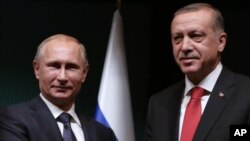Russia's decision to cancel a gas pipeline to Bulgaria in preference to Turkey is being heralded as an important victory for Ankara in its ambitions to become a regional energy hub. But there are growing doubts over how advantageous the pipeline will be for Turkey.
The memorandum of understanding signed by Russian President Vladimir Putin and his Turkish counterpart to build a natural gas pipeline to Turkey could be a major step towards achieving a strategic goal for Ankara, according to Sinan Ulgen of the Carnegie Institute in Brussels.
"Potentially very significant; if it comes into being it will give a huge boost to Turkey’s aspirations to become a regional energy hub. Turkey wants to aggregate different sources of natural gas and trade them and export them to Europe on its own commercial terms," said Ulgen.
Benefits unclear
The new pipeline will replace the $45 billion South Stream gas pipeline that would have run from Russia to Bulgaria. Putin blamed delays by Sofia for his decision to cancel the South Stream project. Turkey, which is energy poor, has long sought to exploit its location between oil- and gas-rich countries to its east and south and the key market of the European Union. But energy expert Emre Iseri of Yasar University in Izmir, Turkey, says it is unclear how much Ankara will benefit from a new Russian gas pipeline.
"It depends on the terms, because Turkey has a variety of energy deals with Russia but in those agreements Turkey does not have the resell option, meaning Turkey could not make money out of selling Russian gas. So the terms of agreement on building the Russia pipeline is critical. Turkey has [the] ambition of being energy hub in the region. So energy hub means that goes beyond being transit state," said Iseri.
The price of the Russian gas is also seen as a potential stumbling block. Second only to Iran, Russian gas is the most expensive that Turkey buys. To sweeten the new pipeline deal, Mr. Putin announced a 6 percent price cut, but Turkish officials say that is not enough. Analyst Ulgen says Moscow might accommodate Ankara’s demands as the new pipeline is motivated by strategic as well as economic objectives.
"There is desire on Russia side to establish [a] closer relationship with Turkey and to eventually try to leverage the energy ties to pull Turkey away from Europe and close to the Russian position. That certainly would be one of the motivations for canceling South Stream and for directing these huge flows of natural gas to Turkey," said Ulgen.
During Putin’s state visit to Turkey last week, he described Turkey as a “strategic partner.” Analysts point out both the Russian president and Turkey's President Recep Tayyip Erdogan appear to be cut from similar political cloth, being criticized for authoritarian tendencies and frequently criticizing Western countries. But there is concern in Ankara over its energy dependency, with Russia currently providing 57 percent of its total gas imports. The proposed new pipeline could raise that figure to over 70 percent.
Increased energy dependency expected
Turkey’s energy dependency is set to rise further, with Russia building the country’s first nuclear power station, with the $20 billion price tag financed by Russian loans. Energy expert Iseri says such dependency risks sacrificing a strategic goal of Ankara’s.
"Some analysts including me are talking about double jeopardy, because both on nuclear and natural gas we are relying on Russian energy. So in that case it's going to have significant political implications in the region. Turkey and Russia do not have anything in common in the region. In the case of Syria, Nagorno-Karabakh, Ukraine, Cyprus, they are all on different pages. And by becoming too dependent on Russia it means that your prospects to become an order maker in the region is not that bright," said Iseri.
Until now, Ankara shared a policy with the European Union of reducing dependency on Russian gas. Construction is due to start next year on the Trans Anatolian Natural Gas Pipeline, or TANAP, which will supply gas from Azerbaijan to Turkey and the EU.
During a visit to Baku on Wednesday, Turkish Foreign Minister Mevlut Cavusoglu reiterated that TANAP is the priority for Turkey. Analysts say Moscow still has a lot of work to do to convince Ankara of the merits of a new Russian gas pipeline.











